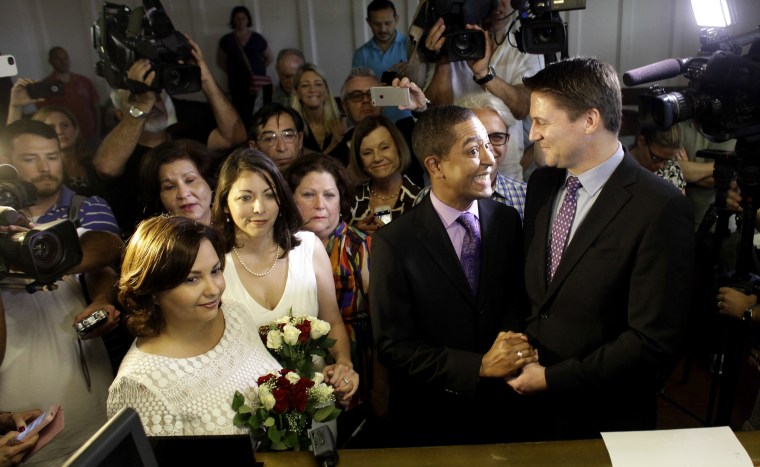This column is part of "The State of America," an msnbc.com series leading up to President Barack Obama’s 2015 State of the Union Address on Tuesday, Jan. 20. This is the state of the issues you care about, as told by organizations promoting social change and other policy experts.
If you want to understand the state of the union for lesbian, gay, bisexual and transgender (LGBT) Americans, you should begin with the new faces in Congress. It’s undeniable President Obama continues to be a true champion of equality—and he’s joined by a bipartisan coalition in both the House and the Senate in fighting for pro-equality measures. But no matter what President Obama says in his remarks about LGBT equality on Tuesday night, you can be sure that many of these new members will have other ideas in mind.
"It’s important to read beyond the headlines of progress for marriage equality ... The truth is that the equality LGBT people have won in this country is incomplete, new, brittle, and it faces a blistering counterattack on all fronts."'
Take Represenative Jody Hice of Georgia for instance, freshly elected in 2014. Represenative Hice has compared marriage equality to bestiality and incest. He’s compared being LGBT to alcoholism and drug addiction—and has suggested that we, as a community, are “enslave[ed]” by our lifestyle.
That’s just the beginning. Fellow newbie Represenative Glenn Grothman has said loving gay and lesbian couples shouldn’t have access to family and medical leave to care for their loved ones. Representative Cresent Hardy wants to re-instate Don’t Ask, Don’t Tell. And of course, Senator Ted Cruz wants to introduce every bill he can to dismiss and defame LGBT people and their families.
So when you think about how the LGBT community is doing in this country, it’s important to read beyond the headlines of progress for marriage equality in courtrooms from Mississippi to Montana. It’s not sufficient to be satisfied with representations of LGBT characters in television and media. The truth is that the equality LGBT people have won in this country is incomplete, new, brittle, and it faces a blistering counterattack on all fronts.
Related: Supreme Court to rule on same-sex marriage
Today, more than 200 million Americans live in a state with marriage equality for committed and loving gay and lesbian couples. But fully half of those people live in a state where there is no statewide non-discrimination law on the books. That means LGBT people in these states risk being fired, evicted, or denied service on the basis of their identity. There’s no state law that says that can’t happen, and too often, it does happen. For transgender Americans in particular, living openly and honestly as their true self also means that they are denied opportunity, fairness, even basic dignity. Equality has not yet been achieved.
That’s why, despite the Jody Hices and Ted Cruzes of the world, the Human Rights Campaign, the nation’s largest LGBT civil rights organization, will fight for a sweeping new federal non-discrimination bill in this session of Congress. We’ve got to guarantee that the federal non-discrimination standards we set apply to everyone—and that the LGBT community from Mississippi to Montana can be certain that the law has their back.
But that’s only one piece of the puzzle.
"In 2015 the LGBT movement will keep fighting until equality is a reality in all 50 states — and no LGBT person has to suffer in second class citizenship."'
Today, the bigoted anti-LGBT activists that are losing the fight here in the United States are taking their hate overseas. From Russia, to Uganda, to Brunei, HRC has documented and exposed how these radical provocateurs are seeding hateful global laws that target LGBT people with arrest, jail time, or worse. In 2011, then-Secretary of State Hillary Clinton declared in a speech in Geneva that LGBT rights are human rights around the globe. In the coming years, it should be a national imperative to make that vision become a reality.
Today, the state of the union for LGBT people is deeply imperfect, but progress is being made. LGBT people face big challenges, but at the root of all these challenges is a simple truth. LGBT people have the same hopes, dreams and aspirations as anyone else. Legal discrimination makes achieving these dreams much harder. Harassment, even violence, sometimes makes these aspirations seem out of reach. But LGBT people still seek fairness and opportunity, safety and security for our families, hope and optimism for the future, and the freedom that comes from knowing that the founding documents of this nation belong to us, too.
Representative Jody Hice may not care about all that, but President Barack Obama does. So do many in both parties in both Houses of Congress. Most importantly, so do the vast majority of the American people. And in 2015 the LGBT movement will keep fighting until equality is a reality in all 50 states -- and no LGBT person has to suffer in second class citizenship.
Adam Talbot is a spokesperson for the Human Rights Campaign, the nation's largest lesbian, gay, bisexual and transgender (LGBT) civil rights organization.
